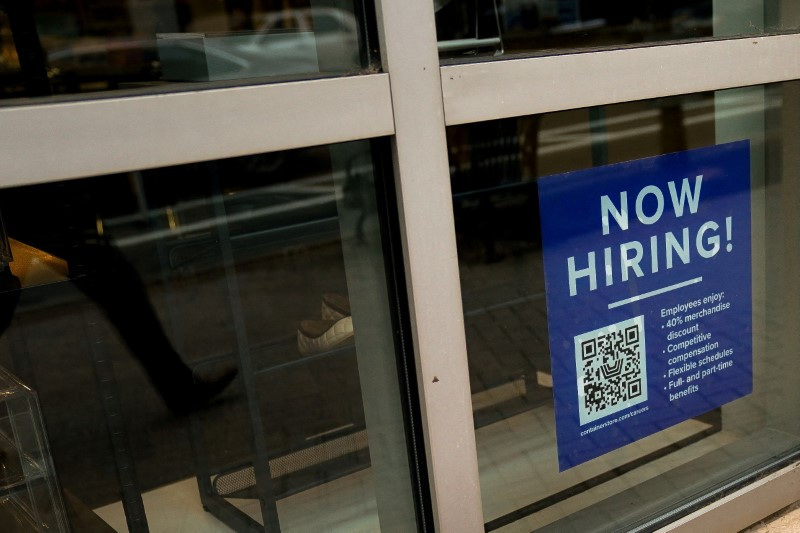Stock Markets
US services sector cools in November; prices stay elevated

By Lucia Mutikani
WASHINGTON (Reuters) -U.S. services sector activity slowed in November after posting big gains in recent months, but remained above levels consistent with solid economic growth in the fourth quarter.
The Institute for Supply Management survey on Wednesday also showed businesses are worried about potential tariffs on imports from President-elect Donald Trump’s incoming administration, warning of higher prices. Economists have echoed similar sentiments.
Trump has said he would impose a 25% tariff on all products from Mexico and Canada and an additional 10% tariff on goods from China on his first day in office.
“Many businesses fled to the sidelines in terms of capital spending plans in advance of the election,” said Stephen Stanley chief U.S. economist at Santander (BME:) U.S. Capital Markets. “I am generally optimistic about the medium-to-long-term outlook for business investment, but firms are likely to take their time before reengaging, waiting to see the details of tax, regulatory, and trade policy from the incoming administration.”
The ISM said its nonmanufacturing purchasing managers index slipped to 52.1 last month after surging to 56.0 in October, which was the highest level since August 2022.
Economists polled by Reuters had forecast the services PMI would ease to 55.5. A PMI reading above 50 indicates growth in the services sector, which accounts for more than two-thirds of the economy. The ISM views PMI readings above 49 over time as generally indicating an expansion of the overall economy.
The economy appears to have retained its momentum from the third quarter, with consumer spending rising at a brisk clip in October. Spending likely remained strong in November as auto sales surged last month. Construction spending also picked up in October, though business spending on equipment likely softened.
The Atlanta Federal Reserve is currently forecasting gross domestic product will rise at a 3.2% annualized rate this quarter. The economy grew at a 2.8% pace in the third quarter.
Despite the moderation in services PMI, more businesses reported growth last month relative to October. Among the 14 industries reporting expansion were wholesale trade, finance and insurance as well as construction and utilities. Only three industries, including mining, reported contraction.
Tariffs were top of mind for several businesses. Some in the construction industry said while they expected an increase in homebuilding, “the unknown effect of tariffs clouds the future.” Others in the information sector feared that “tariffs will affect prices for electronics and components in 2025.”
Similar sentiments were expressed by some providers of professional, scientific and technical services, who warned of a negative impact on inventories and higher prices in the hospital supply chain, adding that “what we saw during COVID-19 with startup U.S. production is a warning sign.”
Others in the transportation and warehousing industry said they were “holding capital projects until the (Trump) cabinet is complete.”
The ISM survey’s new orders measure fell to 53.7 from 57.4 in October. Nonetheless, domestic demand remains solid.
STRONG AUTO SALES
Data late on Tuesday showed motor vehicle sales increased to a seasonally adjusted annualized rate of 16.5 million units in November, the highest level since May 2021, from a pace of 16 million units in October. Oxford Economics estimated the rise in auto sales left consumer spending, adjusted for inflation, on track to exceed a 3% growth pace in the fourth quarter.
Consumer spending, which accounts for more than two-thirds of the economy, grew at a 3.5% rate in the third quarter.
Stocks on Wall Street were trading higher. The dollar slipped against a basket of currencies. U.S. Treasury yields fell.
“Some of the increase in vehicle sales over the past couple of months is inflated because of replacement demand following the recent hurricanes,” said Ryan Sweet, chief U.S. economist at Oxford Economics. “We expect this support to fade in December and the road ahead for vehicle sales is paved by fundamentals. The good news is that fundamentals will remain decent.”
Historically low layoffs and solid wage gains as well as high household net worth are driving consumer spending.
The survey’s prices paid measure for services inputs was little changed at 58.2. Rising prices for services like transportation, financial services and insurance have stalled progress in lowering inflation to the U.S. central bank’s 2% target.
The survey’s measure of services employment slipped to 51.5 from 53.0 in October. This measure has not been a good predictor of services payrolls in the government’s closely watched employment report.
Economists were equally dismissive of the release on Wednesday of the ADP National Employment Report, which showed private payrolls rose by 146,000 jobs in November after advancing by a downwardly revised 184,000 in October. Economists had forecast private employment would increase by 150,000 positions after a previously reported jump of 233,000 in October.
Nonfarm payrolls are expected to have accelerated in November after almost stalling amid disruptions from Hurricanes Helene and Milton as well as strikes by factory workers at Boeing (NYSE:) and another aerospace company.
Payrolls likely increased by 200,000 jobs in November after rising by only 12,000 in October, the lowest number since December 2020, a Reuters survey showed.

“The ADP tends to count striking workers and workers who couldn’t be paid because of weather as employed, whereas the BLS (Bureau of Labor Statistics) would not,” said Abiel Reinhart, an economist at J.P. Morgan.
“The implication for November then is also that ADP wouldn’t show a bounce-back from the end of the Boeing strike and hurricane effects. Those effects are driving our forecast for a large 275,000 gain in total payrolls in Friday’s BLS report.”
Stock Markets
Bitcoin’s new record lifts industry stocks ahead of ‘Crypto Week’ in Washington
Stock Markets
S&P 500 climbs to keep record in sight as chip stocks ride ongoing AI-led demand
Stock Markets
Deutsche Bank starts Cinemark at Buy as it sees box office recovery driving cash

 Forex3 years ago
Forex3 years agoForex Today: the dollar is gaining strength amid gloomy sentiment at the start of the Fed’s week

 Forex3 years ago
Forex3 years agoUnbiased review of Pocket Option broker

 Forex3 years ago
Forex3 years agoDollar to pound sterling exchange rate today: Pound plummeted to its lowest since 1985

 Forex3 years ago
Forex3 years agoHow is the Australian dollar doing today?

 Cryptocurrency3 years ago
Cryptocurrency3 years agoWhat happened in the crypto market – current events today

 World3 years ago
World3 years agoWhy are modern video games an art form?

 Commodities3 years ago
Commodities3 years agoCopper continues to fall in price on expectations of lower demand in China

 Economy3 years ago
Economy3 years agoCrude oil tankers double in price due to EU anti-Russian sanctions


























